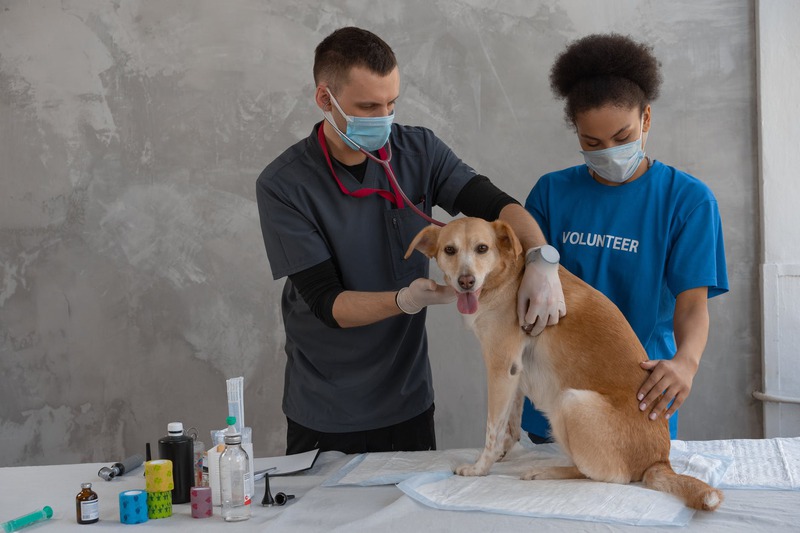When we think about our pets’ health, we often consider their diet, exercise, and regular check-ups. However, dental care is a crucial component of overall pet health that sometimes takes a back seat. We overlook that our furry companions can suffer from dental problems just as we humans can, impacting not only their mouths but also their overall health and well-being.
Veterinary Dentistry and Dental Surgery
Believe it or not, dog dental care is as essential as vaccination or routine wellness checks. Just like humans, dental health in dogs can be a clear indicator of their overall health status. Neglecting those pearly whites can lead to a wide range of problems, including plaque build-up, gum disease, and even serious infections that can spread beyond the mouth.
Moreover, proper dental care isn’t just about brushing; it involves regular check-ups with a veterinarian who can spot issues early on and perform necessary dental surgeries to correct any problems. Professional cleaning and surgeries can go a long way in keeping your pet’s mouth healthy and, by extension, their body, too.
The Link Between Dental Health and Systemic Issues
It’s not an exaggeration to say that a problem in the mouth can wreak havoc elsewhere in a pet’s body. When dental issues are not addressed promptly, they can lead to systemic health problems. Here are some ways how:
-
Infection and Organ Damage: Bacteria from periodontal disease can enter the bloodstream and spread to the heart, liver, or kidneys, potentially causing infections that can be detrimental to these vital organs.
-
Chronic Pain: We may not always see it, but our pets can experience chronic pain from dental conditions. This pain can lead to stress, which can, in turn, affect their immune system and overall health.
-
Loss of Appetite and Weight Loss: Dental pain or discomfort can cause pets to eat less or avoid food altogether, which can result in significant weight loss and malnutrition.
-
Behavioral Changes: When pets are in pain, they might not be their usual selves. They might become irritable, less active, or even depressed—clear indicators that something is amiss with their health.
Common Dental Health Problems in Pets
Our pets are susceptible to a variety of dental problems, and it’s our job to keep an eye out for the telltale signs. Some common issues include:
-
Periodontal Disease: This is the most common dental condition in dogs and cats. It starts with plaque build-up and can progress to infect the gums and bone surrounding teeth.
-
Tooth Decay: Though less common in pets than in humans, tooth decay can still occur, often leading to cavities and infection.
-
Broken Teeth: Broken or chipped teeth can result from trauma or chewing on hard objects. These fractures can expose the sensitive inner part of the tooth, leading to pain and possible infections.
Preventing Dental Issues in Pets
The good news is that many dental issues can be prevented with a bit of care and attention. Here are a few preventative measures:
-
Brush your pet’s teeth regularly with a toothpaste that’s specifically formulated for them.
-
Provide dental chews and toys that help to reduce plaque and tartar build-up.
-
Schedule regular dental check-ups with your vet to catch and address any issues early on.
Pet Vaccinations and Parasite Prevention
It’s crucial to talk about the broader picture of pet wellness, which includes routine care such as vaccinations and parasite prevention. Keeping up with dog shots in Laguna Beach, CA, for example, can help protect your furry friend from a number of serious diseases that can compromise their health and longevity.
Vaccines are vital in protecting pets from illnesses like rabies, distemper, and parvovirus. These preventable diseases can often have a direct or indirect impact on oral health, as well. A robust immune system, bolstered by proper vaccinations, helps pets resist the kinds of infections that can start in the mouth.
Complimentary Measures for Pet Health
In addition to vaccines, regular parasite control is an integral part of maintaining your pet’s health. Parasites can cause a range of issues, from skin irritation to more serious conditions like heartworm disease, which requires a healthy mouth for optimal nutrition to combat illness. By keeping your pets free of parasites and up-to-date on their vaccines, you’re taking a comprehensive approach to their health, which includes their dental well-being.
Boarding for Pets
If you’re planning a trip and can’t take your four-legged friend with you, ensuring they receive the best care in your absence is a top priority. Ensuring a safe and comfortable environment for your pet is crucial, and that’s where boarding comes into play. To find a reputable boarding facility that will look after your pet’s overall and dental health, you can start your search with a simple click here.
Choosing the Right Boarding Facility
When selecting a boarding facility, it’s worth looking into the type of care your pet will receive, including their dental health needs. A good boarding facility will have protocols in place to deal with any medical emergencies, including dental issues. Questions to ask include:
-
Does the facility have a relationship with a nearby vet or an on-call veterinary service?
-
Can they administer routine medication or dental care if needed?
-
What are their procedures in case of a health emergency?
Making sure your pet’s boarding home is equipped to maintain their dental hygiene routine can save you a lot of worries while you’re away.
Wrapping Up
Dental issues in pets might sound like a small thing, but they can lead to serious health consequences if not addressed. Taking steps to maintain your pet’s dental health is a crucial aspect of their overall care. From regular brushing and veterinary visits to ensuring proper vaccines and parasite prevention, each aspect plays a part in keeping your pet healthy.
And when you need to be away, choosing the right boarding facility will ensure that your pet’s health, including their precious smile, is looked after. Keep these factors in mind, and you’ll be setting your pet up for a healthier, happier life, one tooth at a time.





